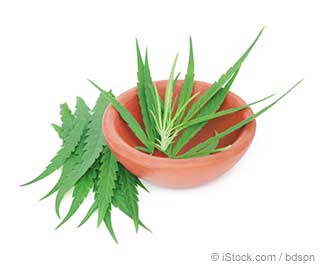A controversial crop that’s been alternately demonized and defended for at least 80 years, hemp has run the proverbial gauntlet in the US due to political factions, special interests, and downright suspicion.
Nevertheless, every bit of this ancient plant is useful and valuable, and not just for rope, but for textiles, auto parts, cosmetics, dynamite, supplements, food, and medicine. In ancient China, hemp seed was regarded as food for the lower classes, and in Europe, a peanut butter-like spread was made from the seeds, in both cases with the hulls intact.
Today, you’ll find nutty-tasting (hull-less) hemp seeds and their oils baked in breads, cookies, and cakes, blended in smoothies, or tossed into quinoa and pasta dishes, burgers, pizza, vegetables sautés, soups, salads, oatmeal, yogurt, trail mix, and salad dressings. It’s a niche market, with a growing number of specialty outlets due to a growing understanding of this food’s nutritional benefits.
Cultivated in at least 30 countries, monikers for the hemp plant often allude to its origin or use, such as Manila hemp (abacá, Musa textilis), sisal hemp (Agave sisalana), Indian hemp (Apocynumcannabinum) and New Zealand hemp (Phormiumtenax). Worldwide, hemp seed production alone has soared from around 33,000 metric tons in the late ’90s to more than 100,000 metric tons annually between 2005 and 2011.
Jefferson penned, “Hemp is of first necessity to the wealth and protection of the country,” so hemp held a distinguished place in early America. Colonial farmers were required to grow it in the 1700s, mainly for its strong fiber.
By 1938, Popular Mechanics called hemp the “Billion Dollar Crop,”1 praising its potential to produce 25,000 different products, as high as $192 billion in today’s market and capable of producing four times the paper per acre than trees. Farmers from the Midwest to the East coast harvested more than 150,000 acres for the war’s Hemp for Victory Program, implemented by the USDA from 1942 through 1946, but rumblings by the competition had already started.
American industrialists led by newspaper mogul William Randolph Hearst (who owned vast timberlands) and DuPont executives, who’d begun processing petroleum and wood for plastics, became disgruntled by the way hemp cut into their market shares. A 1994 Vegetarian Times article2 describes the group’s devastatingly successful tactics for twisting the public’s perception of hemp:
“The plan? Whip the public into a frenzy over ill effects of marijuana, the psychoactive leaves and flowers of the hemp plant; the reputation of the fibers and seeds used by industry would be posing little threat to society emerged as the ‘assassin of youth.’ The strategy worked. In 1937, with virtually no warning, Congress announced a prohibitive tax on hemp, effectively ending the production and sale of the plant in the United States.
“The effects of the ban on growing hemp were widespread. Polluting, nonrenewable petroleum products replaced hemp lubricants and paints and oil… From that point on, hemp was viewed solely as an illegal drug; its role in constructing our national economy was forgotten.”
This perpetuated what may be one of the country’s biggest frauds. An aptly named article nailed it: “US Missing Out On Agricultural Millions Because The DEA Can't Distinguish Hemp From Pot,”3 which is telling.
It’s not just the debate about medical marijuana. Part of the confusion is that some people assume hemp and marijuana are one in the same, especially since in explicably, they share the scientific name Cannabis sativa. But the word is not the thing. While they both belong to the same plant species, they’re two distinct varieties.
A website dedicated to the re-legalization of hemp4 briefly explains the three cannabis species:
- Cannabis Sativa– This annual herb in the Cannabaceae family has been cultivated for centuries for use as an industrial fiber, seed oil, food, drug, medicine, and spiritual tool. Mostly used for its long fibers, each part of the plant is harvested differently, depending on the purpose of its use.
- Cannabis Indica – The annual plant of the Cannabaceae family is considered a species of the genus Cannabis, but separate from Cannabis sativa, and originating in the Hindu Kush Mountains and suited for cultivation in temperate climates. Used to induce sleep, the plant is described as relatively short and conical with dense branches and short, broad leaves, while Cannabis sativa is tall with fewer branches and long, narrow leaves.
- Cannabis Ruderalis – Thought to be a cannabis species originating in central Asia, it flowers earlier, is much smaller, and can withstand much harsher climates than either Cannabis indica or Cannabis sativa. This species purportedly buds based on age rather than changes in length of daylight, known as auto-flowering. It’s used primarily for food production, such as hemp seeds and hemp seed oil.
Perhaps the most important difference between hemp and marijuana is that marijuana – no pun intended – has a high delta-9 tetrahydrocannabinol content, or THC, which supplies the sought-after psychotropic effect, but it’s low in cannabidiol content, or CBD, which has medicinal properties. Hemp is just the opposite, being typically high in CBD and low in THC, meaning it’s not going to get anybody stoned. In fact, clinical studies show that CBD blocks the effect of THC in the nervous system. Both THC and CBD contain cannabinoid, but it’s the amount that needs to examined, because CBD is currently a Schedule 1 controlled substance. That means that at present, there’s currently no permissible medical protocol in the US.
The Hemp Farming Act of 2018 was a proposed law to remove hemp (defined as cannabis with less than 0.3% THC) from Schedule I controlled substances and making it an ordinary agricultural commodity. Its provisions were incorporated in the 2018 United States farm bill that became law on December 20, 2018.
Health Benefits of Hemp
The main nutritional sources of hemp come in the seeds and the oil.
Touted as a “superfood” containing a highly concentrated balance of proteins (less than soybeans, but much higher than wheat, oats, rye, corn, or barley), hemp seeds contain a balanced 1:3 ratio of omega-3 and omega-6 essential fatty acids (“essential” meaning your body can’t produce it, so it has to come from an outside source). This amounts to more than any fish and most fish oil supplements. They also offer super omega-3 stearidonic acid and super omega-6-gamma-linolenic acid (which the North American diet seriously lacks). Between these compounds, you get reduced inflammation, improved brain function, and lowered blood pressure, cholesterol, stroke, and heart disease risk, as well as increased energy and potential weight loss.
More round, soft, and green than sesame seeds and slightly sweeter than sunflower seeds, hemp seeds can be used to make hemp nut butter with a slight greenish cast from the chlorophyll. The oil has been described as having a pleasantly nutty, slightly bitter taste, and off-yellow to dark green coloring. High in unsaturated fatty acids, it can easily oxidize, so it’s not recommended for frying or baking.
Regarding hemp oil, an article7 on Purdue University’s agricultural website has a lot to say about the positives of hemp oil:
“Hemp is of high nutritional quality because it contains high amounts of unsaturated fatty acids… Linoleic acid and alpha-linolenic acid are the only two fatty acids that must be ingested and are considered essential to human health … In contrast to shorter-chain and more saturated fatty acids, these essential fatty acids do not serve as energy sources, but as raw materials for cell structure and as precursors for biosynthesis for many of the body’s regulatory biochemicals…”
The article states that hemp is the only current natural food source of gamma-linolenic acid, or GLA:
“…known to affect vital metabolic roles in humans, ranging from control of inflammation and vascular tone to initiation of contractions during childbirth. GLA has been found to alleviate psoriasis, atopic eczema, and mastalgia, and may also benefit cardiovascular, psychiatric, and immunological disorders.”
Containing 75-80 percent of the polyunsaturated “good fats” and only 9-11 percent of the “bad fats,” hemp seed oil has the lowest unsaturated oil of all other plants. The GLAs help balance your hormones and maintain healthy hair, skin, and nails.
Of the 20 known amino acids, hemp supplies them all, including the essential ones the body can’t produce, known as EAAs. About 65 percent of the protein in hemp seeds is edestin, a globulin protein that aids in digestion, similar to the globulin found in human blood plasma, and hemp seeds are the only place they’re found. The other third is made up of the protein albumin.
Also high in fiber, hemp seeds are more digestible than any other high-protein food, including meat, cheese, eggs, human milk, or cows’ milk. They’re high in antioxidants, and minerals like iron, zinc and copper as well as calcium, magnesium, potassium, carotene, thiamin (vitamin B1), riboflavin (vitamin B2), vitamin B6 and vitamin E. If that’s not enough, there’s also chlorophyll, sulfur, phosphorus, phospholipids, and phytosterols.
People suffering from maladies like tuberculosis, psoriasis, and even colon and prostate cancer report advantageous effects from adding hemp to their diets.
A LeafScience.com article8 notes other benefits:
- Antiemetic – reduces nausea and vomiting
- Anticonvulsant – controls seizures
- Antipsychotic – fights psychotic disorders
- Antioxidant – fights neurological/degenerative disorders
- Anti-tumor/anti-cancer – combats tumors and cancer cells
- Antidepressant – controls depression and anxiety
Studies on Hemp
Scientists in Europe and North America concluded that hemp seed is an excellent source of nutrition. Numerous anecdotal incidences cited improvements in a wide range of acute and chronic conditions such as rapid healing of skin lesions and relief from flu, inflammation, and allergies. The benefits were attributed to the presence of rich source of the EFAs linoleic and alpha-linolenic acid, and their respective biologic metabolites, GLA and stearidonic acid.9
Recent research was undertaken on the benefits of hemp seed oil with low (0.3%) THC content, recently legalized by the European Union Benefits included the prevention of heart disease and lower risk of cancer and heart attack, lowered cholesterol, and beneficial against such degenerative diseases as atherosclerosis and Alzheimer's.10
Scientists found DNA-altering, detrimental, and damaging potential from ingested cannabis smoke, and even the possibility of initiating cancer development.11
Order your organic, GMP certified, lab tested CBD here
Certificate of Analysis can be provide upon request. 60 day, empty bottle, money back guaranty!
Mercola.com
Disclaimer:
The information made available on this page is
based on studies and research as well as reported experiences from CBD product users.
For a medical condition always consult with a
healthcare professional before consuming CBD. These products are not intended
to diagnose, treat, cure, or prevent disease, ailment or skin condition. Any
information contained in or made available on our website is not intended to be
used as, or be a substitute for, healthcare advice or information from licensed
healthcare practitioners. Please consult a licensed health care practitioner
regarding any potential interactions or complications before using our
products.
This website https://pammysperfectdrops.blogspot.com
is not a part of the Facebook website or Facebook, Inc.
Additionally, this website is NOT
endorsed by Facebook or any other website in any way. Facebook is a trademark of Facebook, Inc.




Comments
Post a Comment